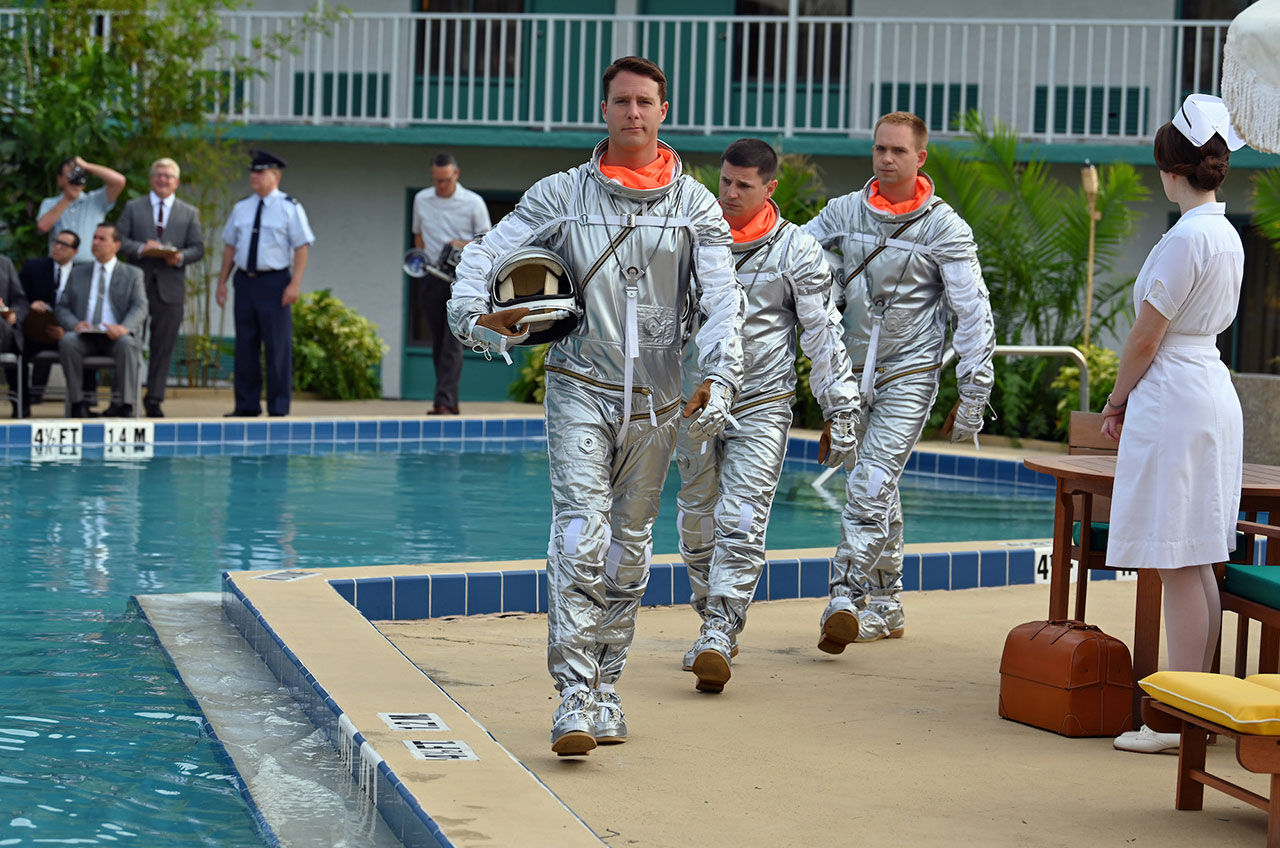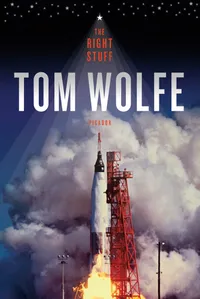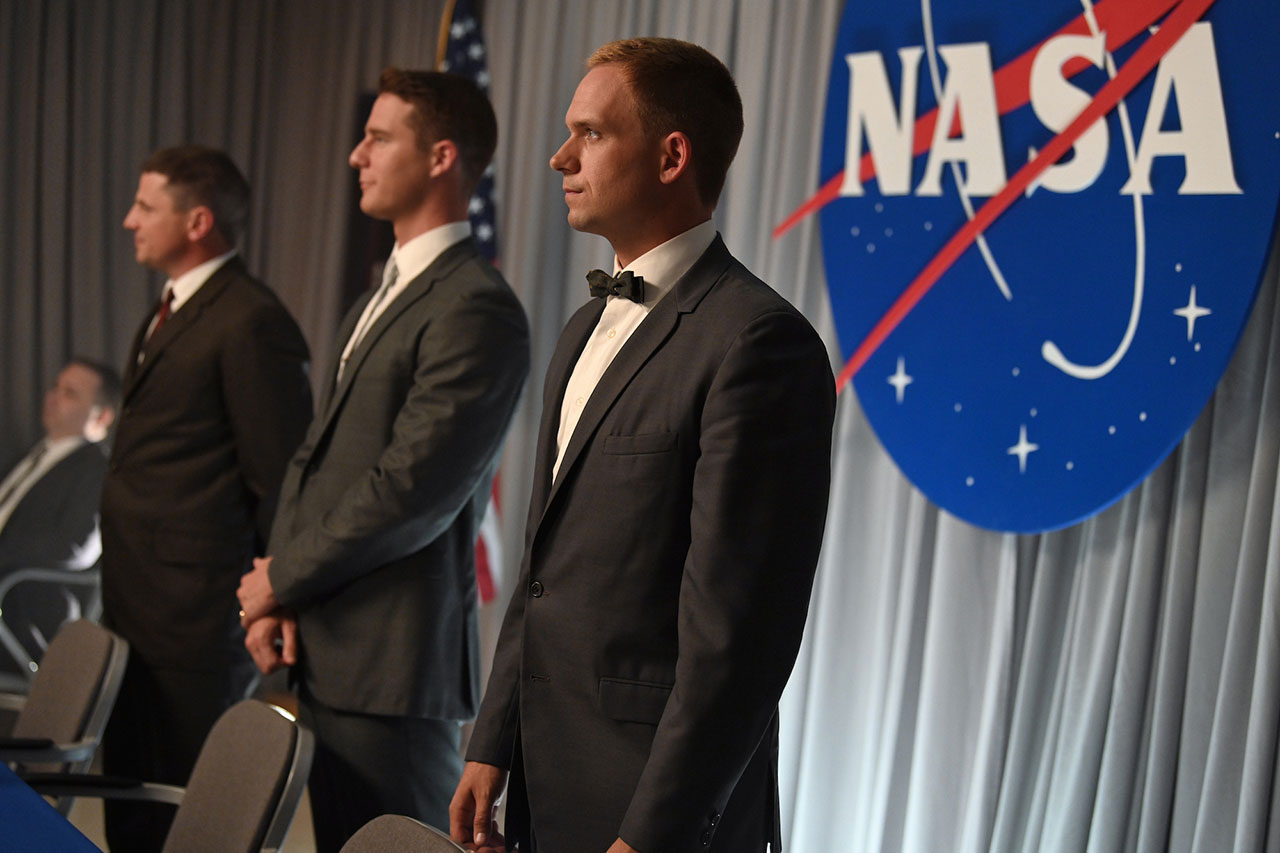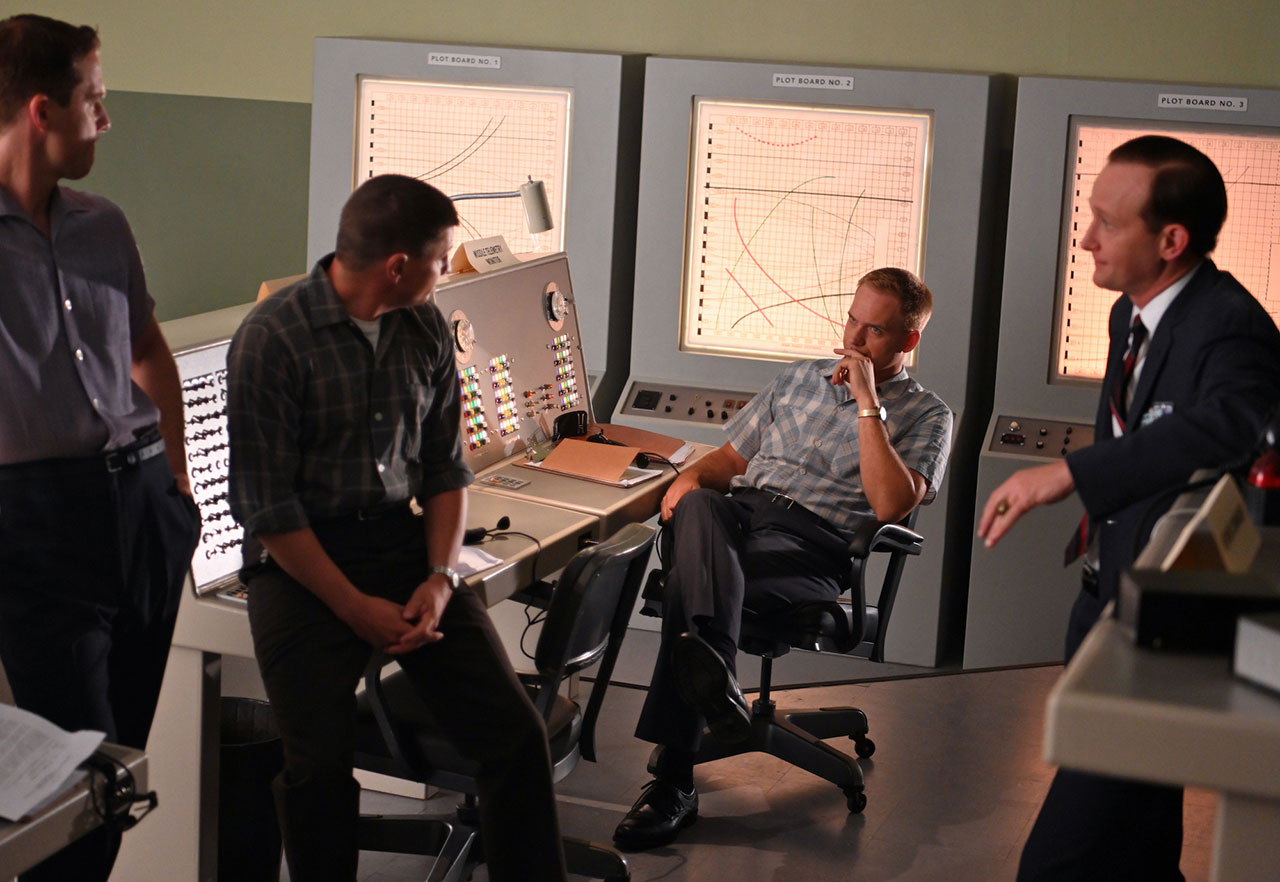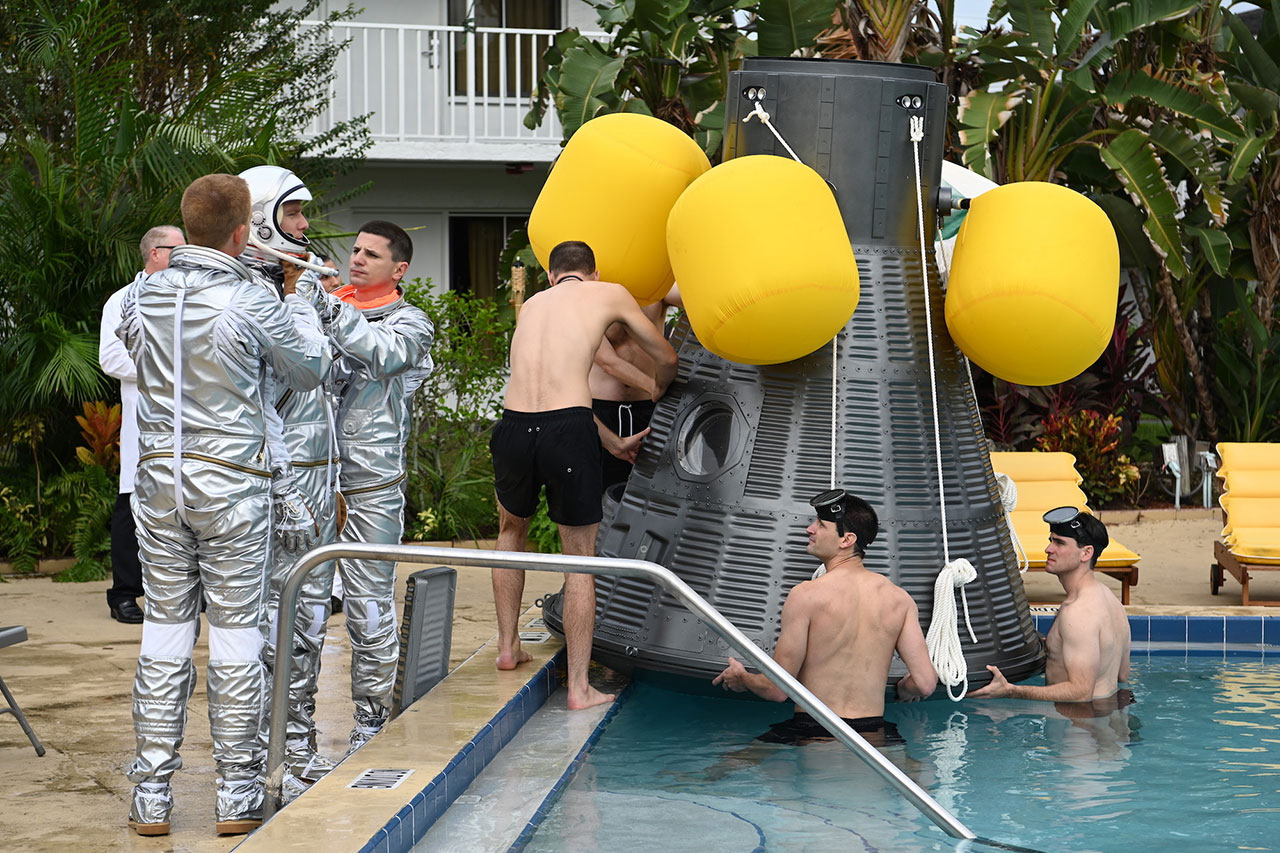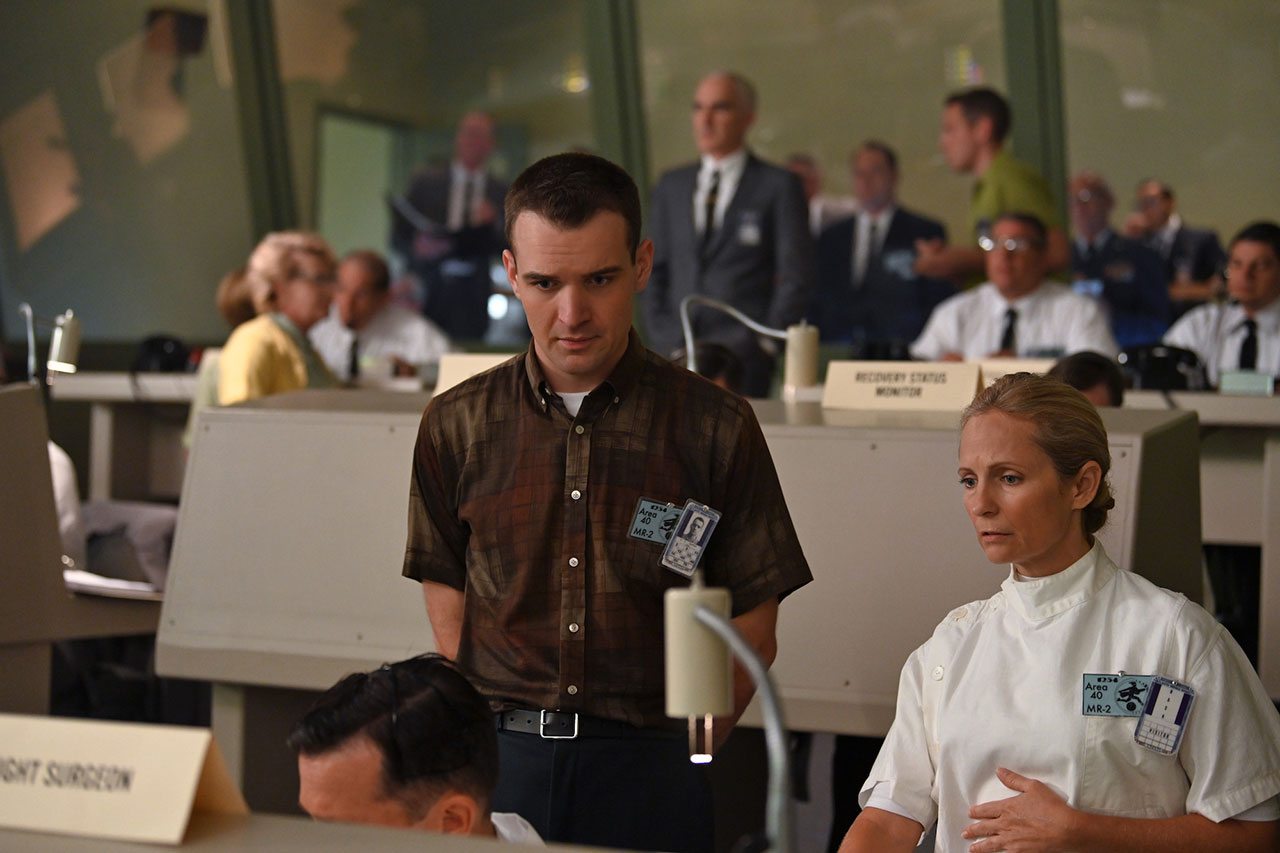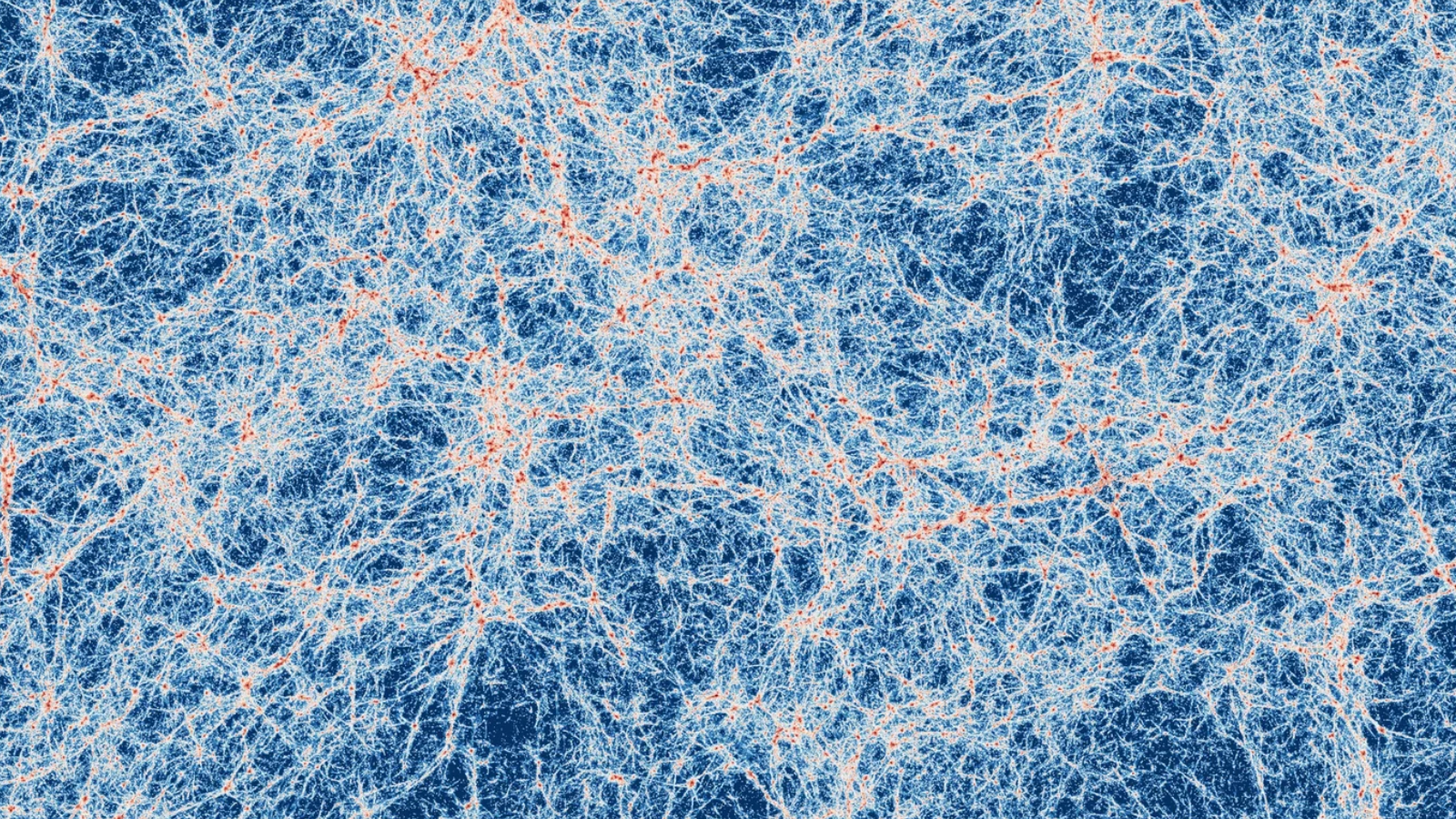'The Right Stuff' recap: We are all asleep down here ('Vostok')
NASA faces more challenges and delays in episode 6.
Breaking space news, the latest updates on rocket launches, skywatching events and more!
You are now subscribed
Your newsletter sign-up was successful
Want to add more newsletters?

Delivered daily
Daily Newsletter
Breaking space news, the latest updates on rocket launches, skywatching events and more!

Once a month
Watch This Space
Sign up to our monthly entertainment newsletter to keep up with all our coverage of the latest sci-fi and space movies, tv shows, games and books.

Once a week
Night Sky This Week
Discover this week's must-see night sky events, moon phases, and stunning astrophotos. Sign up for our skywatching newsletter and explore the universe with us!

Twice a month
Strange New Words
Space.com's Sci-Fi Reader's Club. Read a sci-fi short story every month and join a virtual community of fellow science fiction fans!
As the race to launch the first astronaut into space heats up, NASA faces more challenges — and delays — in the sixth episode of National Geographic's "The Right Stuff."
In "Vostok," now streaming on Disney Plus, the Mercury astronauts face bureaucratic scrutiny, technical setbacks and their own personal demons, which all threaten to derail the burgeoning space program. "The Right Stuff" is based on journalist Tom Wolfe's 1979 bestselling book by the same title.
Related: These astronauts read 'The Right Stuff' and flew in space
Warning: What follows contains spoilers for the series' sixth episode, "Vostok." Skip ahead to the end if you only want to read about the space history portrayed.
- Want to try Disney Plus? You can get a 7-day free trial here
- Sign up for Disney Plus for $6.99/month
Episode 6: 'Vostok'
"Don't forget to smile, John."
Following the results of a peer vote among the seven Mercury astronauts (as shown at the end of Episode 5), the three men who were chosen to fly first — Alan Shepard (Jake McDorman), Gus Grissom (Michael Trotter) and John Glenn (Patrick J. Adams), in that order — are introduced to the press as NASA's "First Team." The space agency's public relations officer, Shorty Powers (Danny Strong), does not divulge that the flight order has already been decided, but rather tells the room full of reporters that "in the next few months, one of these exceptional men will be selected for the first American spaceflight."
Later, as Glenn drives Loudon Wainwright (Josh Cooke) to the airport, the LIFE magazine writer prods the astronaut to reveal if he will be the first to fly. By his thinking, NASA is only looking to "milk the drama" right up until launch day, but has already made the decision. "Hell, they're taking bets on you guys out in Vegas. Guess whose the favorite?" says Wainwright. Glenn pushes back, insisting the agency has not yet made its choice.
Breaking space news, the latest updates on rocket launches, skywatching events and more!
"If you are first, I would push NASA to announce it, the sooner the better. Until it is public, they can still change their minds," Wainwright advises Glenn.
The "First Team" lands on the cover of LIFE. As NASA has "the chosen three" sit and autograph hundreds of copies of the magazine, the other Mercury astronauts — Gordon Cooper (Colin O'Donoghue), Scott Carpenter (James Lafferty), Deke Slayton (Micah Stock) and Wally Schirra (Aaron Staton) — find solace at the Starlite Lounge. After Schirra strikes it out trying to impress the ladies at the bar, an inebriated Cooper starts up a game among the guys of who can catch a glass tossed over their shoulders. The challenge ends with no winner, a lot of broken glass on the floor and Cooper cutting his hand in the same place he did before an ill-fated F-104 test flight (as shown in Episode 1).
The Right Stuff by Tom Wolfe | Save 43% |
Now $10.89 on Amazon
Read the book that inspired a generation of engineers, scientists and astronauts and retells the early days of human spaceflight.
Henri Landwirth (Christopher Cassarino), the owner of the Starlite, helps a drunk, sobbing Cooper back to his hotel room. The broken glass and injury to his hand has brought up memories of Cooper's fellow test pilot, Cal Cunnigham, dying in the F-104 crash. "It should have been me. He was a good guy. He was my friend," Cooper says in tears.
Meanwhile, flight director Chris Kraft (Eric Ladin) and Space Task Group director Bob Gilruth meet with Shepard, Grissom and Glenn at Mercury Mission Control. Kraft reads from a long list of program reviews, from simulation results to medical data, that has been ordered by the Presidential Scientific Advisory Committee (PSAC) led by Jerome Wiesner, the same advisor to President John F. Kennedy who the astronauts met on New Year's Eve (as shown at the end of Episode 4).
"I'm going up in two months. They want us to waste time now? That will give the Russians more time to get there first," says Shepard.
"The President is afraid we're going to blow you up, Al," replies Gilruth. "This committee will issue a report. It will go straight to the President's desk. They need a reason to shut us down. Let's ace these demonstrations."
Related: The Mercury 7 astronauts: NASA's first space travelers
The scene changes to Shepard taking a shower prior to one of the committee's demos. He is suddenly overcome by dizziness and the same ringing in his left ear that he first experienced when riding NASA's Multiple-Axis Space Test Inertia Facility (MASTIF), as shown in Episode 3. He falls to the floor trying to get out of the shower, drawing the attention of nurse Dee O'Hara (Kaley Ronayne). Shepard is able to get to his feet and regain his composure, but O'Hara is concerned.
Shepard, Grissom and Glenn emerge from the Starlite Hotel dressed in their silvery Mercury spacesuits as Gilruth and Kraft welcome the members of the committee, including Wiesner (Todd Allen Durkin). A mockup of a Mercury capsule is floating in the hotel's pool. "In the unlikely event that the capsule splashes down off target or is breached and taking on water, the astronaut can use an emergency egress procedure to safely exit the craft. Lt. Cdr. Shepard will demonstrate that for you now," explains Kraft.
Shepard climbs into the upright capsule, the hatch is closed and then the mockup is pulled over on its side. The movement sets off Shepard's inner ear problem, causing him to briefly stumble, but ultimately he is successful in deploying a raft and exiting through the nose of the spacecraft in time.
That night, Annie Glenn (Nora Zehetner) is woken by the sound of a typewriter. She finds her husband in the bathroom, sitting in an empty bathtub, typing multiple copies of the same letter. "Al Shepard doesn't deserve this. He is selfish, he cannot be trusted. People need to know that. People who can do something about it," Glenn tells Annie. "If this program is going to survive, we need the right man out in front, and that just might be me."
"Until NASA announces Al Shepard to the public, I can still change their minds. This could really work," he says.
"This, it isn't you, John," says Annie, visibly concerned. She grabs the letters and stamps and stores them away in the drawer of her bedside table. Glenn protests, but resigns and returns to bed.
The Glenns aren't the only ones awake. Cooper's daughter Cam (Chandler Head), who is at home in Virginia, calls her father on the phone. She admits to doing "dumb stuff," like riding her bike with her eyes closed and then colliding into the neighbor's car (as shown in Episode 2). Cooper, reflecting on his own recent breakdown at the bar, tries to allay her concerns. Unbeknownst to both, Cooper's wife Trudy (Eloise Mumford) is listening in on the call.
The next morning, Annie wakes to an empty bed — and an empty bedside drawer.
Later, LIFE photographer Ralph Morse (Daryn Kahn) directs a photoshoot with the Gus and Betty Grissom (Rachel Burttram), Alan and Louise Shepard (Shannon Lucio) and the Glenns walking along on the beach.
Back at Gilruth's office, Shepard is informed his flight is being delayed. "They want to send a chimpanzee into space first before your flight," says Gilruth.
A NASA newsreel titled "Trailblazer in Space" plays, introducing "Ham, America's first chimp in space."
The scene skips to the launchpad where a Mercury-Redstone rocket is poised for flight and to mission control, where, in addition to the flight controllers, Slayton and Ham's handler (Denise Gossett) look on. Wernher von Braun (Sacha Seberg) monitors the launch from inside the blockhouse. The initial ascent goes well, until flight controller Glynn Lunney (Jackson Pace) reports, "We're showing on board abort initiated." The Redstone's engine has shut down early, leading to the capsule separating from the rocket and firing its launch escape system.
Kraft finds Gilruth afterwards to give him an update on the outcome of the mission. "They recovered the capsule. Little fella is doing just fine."
Wiesner, who was monitoring the launch from inside mission control, reports back to NASA Administrator James Webb (Michael McCauley). "The rocket was overpowered, causing the capsule to splash down 130 miles off course. It ran out of fuel, it lost pressure, guidance malfunctioned and then it nearly sank!"
Kraft fires back. "The chimp lived. He was fine, look at him, he's smiling," he says, gesturing to a photo in the newspaper. "Chimpanzees do not smile," says Wiesner, "they only bare their teeth when threatened."
Kraft and Wiesner continue to argue over if the flight was a success. Kraft cites the mission's goals, which were met, and had there been an astronaut aboard, he would have survived. Wiesner says it is still too risky, likening it to sailing "a leaky ship because the crew are such good swimmers." Kraft is concerned about losing the space race with the Soviets, while Wiesner is worried about causing a national catastrophe. Von Braun speaks up and accepts responsibility for the Redstone's performance. He proposes making additional refinements, to which Kraft objects.
"Mr. Webb," says Gilruth, putting an end to the bickering back and forth, "the President sent you here to decide the fate of this program so let me ask you this: Did the men who carved this country from a wild frontier shy away from personal risk when they had to cross the Missouri at high flood? Did our founding fathers quibble over semicolons before sending the Declaration of Independence to King George? Sir, our intrepid spirit at challenging times is what makes the United States not merely a great nation, but the greatest of nations."
"There is nothing, nothing more important to us than the safety of our astronauts," he continues, "but this, this sir, is a fight to stir the hearts of entire world. And if we're too timid to bring our best efforts to fruition then the truth is we have already lost."
After the meeting, von Braun and his team, along with Shepard, Grissom, Glenn and Wainwright are at a bar, celebrating the committee's decision to let Project Mercury to proceed. "It turns out the only problem they had was with you lot," von Braun tells the astronauts. "Oh, you did not hear? Something in the medical file just came to light. They are changing the flight order."
Shepard, concerned with what von Braun said, confronts O'Hara in the infirmary. "It was you, you wrote something in my file," Shepard says, accusingly. O'Hara denies having done anything because she does not know anything, as Shepard has not told her anything. "Be a man and go ask Kraft yourself," she tells Shepard.
Glenn arrives home to celebrate his and Annie's anniversary only to find Gilruth waiting for him. The letters that Glenn wrote and sent out earlier expressing his concerns about Shepard have made their way back to Gilruth. "John, right now, you're the one who seems unfit," warns Gilruth after Glenn professes he was only trying to save the program, again.
"This ends here. If Jerome Wiesner got word of this, the whole agency would go ass over tea kettle and who knows what would be left once all the shit got cleared way," states Gilruth.
Building Project Mercury: Test flight photos of NASA's first spaceship
Shepard, meanwhile, makes a beeline for Kraft's office but before he can get there, Slayton arrives. "You wanted to see me?" Slayton asks. Kraft explains that during Wiesner's review of the medical files, they came across Slayton's irregular heart beat. "Arrhythmia, no, that's not a problem. The Air Force surgeons cleared me for flight years ago," Slayton says.
"They think it is too risky. They are grounding you, Deke," replies Kraft. Slayton tries to appeal, but Kraft makes it clear the decision is final. "We're going to find a place for you. We are going to find something for you do here," Kraft says.
Shepard arrives at Kraft's office and, seeing a deflated Slayton though the window, realizes it is not about him and leaves.
Annie, at home and still upset with her husband, opens her anniversary gift, which turns out to be a porcelain gravy boat. "The lady at the shop called it a 'saucier,'" says Glenn.
The scene switches to night and Shorty Powers being woken up by a telephone call. "What? Slow down, slow down. We're all asleep down here," he tells person on the other end of the phone. What Powers hears in return has him go wake up Shepard and Grissom. "It is the Russians," he says. "I am sorry guys, they put a man in orbit."
Shepard, still in his boxers and a robe, walks outside into the rain. A voice from a radio report is heard. "Yuri Gagarin, a Soviet Air Force pilot, is the first man in space. History has spoken and Russia is the victor in the opening battle of the space race."
In Photos: Yuri Gagarin, First Man in Space
The right, wrong and real stuff
At the start of each episode, a disclaimer appears on screen: "This dramatization, although fictionalized, is based on actual events. Dialogue and certain events and characters have been created or altered for dramatic purposes." Here is a look at some of the right, wrong and real stuff the sixth episode portrays:
- NASA announced that Glenn, Grissom and Shepard were selected to begin "concentrated training" for the first American spaceflight on Feb. 21, 1961, following the successful launch of a Mercury capsule atop an Atlas rocket (Mercury-Atlas 2) that same day. There was no press conference with the three astronauts, though. Glenn and Grissom were in Florida to watch the launch, but Grissom was positioned at a tracking station in Bermuda. At a post-flight briefing, Gilruth (rather than Powers as depicted in the episode) told reporters the "specific pilot who will make each flight will be named just before the flight.”
- The title "First Team" comes from LIFE magazine's cover article (written by Loudon Wainwright) for its March 3, 1961 issue. The three astronauts were labeled "Astronaut First Team." The cover as shown in the episode is a faithful reproduction of the original with the actors taking the same poses as the astronauts.
- NASA did not organize a LIFE magazine signing session with the three astronauts. To the contrary, in response to the tremendous demand for their autographs, NASA introduced the use of a mechanical "autopen" machine that would trace a signature pattern onto any item. In addition, Shepard authorized his secretary to sign for him and Grissom's secretary used a rubber stamp for his signature (Glenn insisted on autographing everything himself, if he was available to do so).
- Glenn did drive Wainwright to the airport, but it was on Inauguration Day on Jan. 20, 1961.
- Although the President's Science Advisory Committee (PSAC) was led by Jerome Wiesner in 1961, its ad hoc Mercury panel was chaired by Donald Hornig. The panel spent five days visiting Cape Canaveral and Langley, as well as McDonnell Aircraft where the Mercury capsules were being built in order to prepare their report, which was delivered on April 12, 1961.
- As depicted in the episode, the real-life Wiesner was concerned that "a failure ... resulting in the death of an astronaut would create a situation of serious national embarrassment," but he expressed that apprehension in an earlier document known as the "Wiesner Report," which was published on Jan. 10, 1961, and was separate from the PSAC. Wienser's primary concern at the time was about the scientific value of the manned program. "A crash program aimed at placing a man into an orbit at the earliest possible time cannot be justified solely on scientific or technical grounds.”
- In the episode, the Feb. 12, 1961 letter that Kraft reads from the President's Science Advisory Committee does not match the words he says. While he rattles off a list of items that the PSAC wants to inspect, the letter itself has the text from a May 4, 1961 memorandum from Congressman Overton Brooks, the chairman of the U.S. House of Representatives' Committee on Science and Astronautics, to Vice President Lyndon B. Johnson. The letter, as it appears on screen, makes mention that "we cannot concede the moon to the Soviets," a goal that would come later than the episode's events.
- The astronauts did train to exit the Mercury capsule through its top hatch, but that preparation began in February 1960 in a hydrodynamic basin at Langley Research Center in Virginia, not in the pool at the Starlite Motel. The scene in the episode may have been inspired by early Apollo training sessions that were held in an outdoor pool at Ellington Air Force Base in Houston. It was the Apollo command module, not the Mercury capsule, that had large uprighting balloons.
- Glenn did write a letter protesting the flight order, but it was only to Gilruth. "It was a strong letter, because I felt strongly," wrote Glenn in "John Glenn: A Memoir" (Bantam, 1999). "I gave the letter to Bob when I returned to Langley, but I heard no more about it. We were all following Al [Shepard] now, the decision was made…"
- Ralph Morse was a staff photographer for LIFE magazine who extensively documented the Mercury astronauts and their families. The beach photoshoot in the episode is similar to the type of photos that Morse took.
- Mercury-Redstone 2 (MR-2), which carried the chimpanzee Ham, did not directly delay Shepard's flight, as said in the episode. It was because of the problems experienced on MR-2 that von Braun added Mercury-Redstone BD, or Booster Development, an additional flight, to Shepard's frustration.
- "Trailblazer in Space" is the title of a real Detroit News newsreel about Ham that was produced after his flight in 1961.
- Mercury-Redstone 2 launched on Jan. 31, 1961. The capsule executed an abort as a result of an over-acceleration during the ascent, as the episode shows. After splashdown, the spacecraft took on water, but Ham was okay and performed well during the flight.
- In preparing to film this episode, the production had considered using an animatronic chimpanzee for some of the scenes (rather than the archival footage as seen). As a National Geographic production, the use of a real chimpanzee was not an option.
- As mentioned in our recap of Episode 3, Shepard did experience dizziness and ringing in his left ear after his initial runs on the Multiple-Axis Space Test Inertia Facility, but by all available accounts the symptoms subsided and were not a problem again until after his Mercury mission when he was diagnosed with Ménière's disease.
- Slayton's arrhythmia, or more specifically, idiopathic atrial fibrillation, was diagnosed after a centrifuge run in 1959, but he was cleared to fly (as he [Stock] says in the episode). It was not until March 1962 that Slayton was grounded, two months before he was scheduled to launch into space.
- John and Annie Glenn's anniversary was on April 6. It is unknown if Glenn ever gifted Annie with a gravy boat (or “saucier").
- Soviet cosmonaut Yuri Gagarin became the first person to fly into space and orbit Earth on April 12, 1961. The feat was announced over radio at 2 a.m. EST (10 a.m. in Moscow). The real Shorty Powers was woken by a call from a reporter about an hour later, and, still in a daze, actually said, "We're all asleep down here," as depicted in the episode. Another NASA public affairs official woke Shepard at his hotel, who then saw the news on television.
A new episode of National Geographic's "The Right Stuff" begins streaming on Disney+ every Friday through Nov. 20. Return to collectSPACE.com for weekly recaps.
Follow collectSPACE.com on Facebook and on Twitter at @collectSPACE. Copyright 2020 collectSPACE.com. All rights reserved.

Robert Pearlman is a space historian, journalist and the founder and editor of collectSPACE.com, a daily news publication and community devoted to space history with a particular focus on how and where space exploration intersects with pop culture. Pearlman is also a contributing writer for Space.com and co-author of "Space Stations: The Art, Science, and Reality of Working in Space” published by Smithsonian Books in 2018.
In 2009, he was inducted into the U.S. Space Camp Hall of Fame in Huntsville, Alabama. In 2021, he was honored by the American Astronautical Society with the Ordway Award for Sustained Excellence in Spaceflight History. In 2023, the National Space Club Florida Committee recognized Pearlman with the Kolcum News and Communications Award for excellence in telling the space story along the Space Coast and throughout the world.

